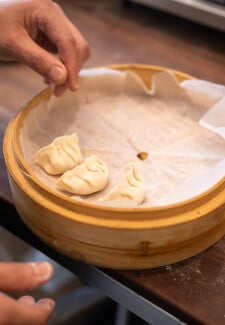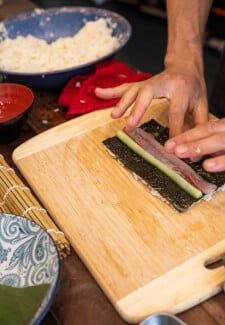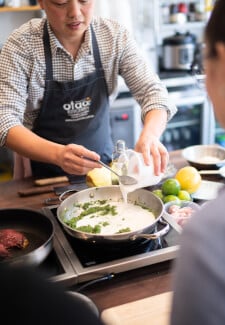Transform your kitchen into an eco-friendly oasis with cooking classes in Melbourne and join the sustainable food movement! These hands-on Melbourne workshops will show you how to cook mouthwatering dishes as well as help you meal plan, reduce your takeaway consumption and shop local.
Discover just how easy it is to eat fresh, delicious and healthy meals every day without breaking the bank and help save the planet while you’re at it. With cooking classes in Melbourne, it’ll be impossible to say no to sustainable cooking.
Plus, cooking classes are some of the best things to do in Melbourne! Whether you're looking for date night ideas, team building activities or a special way to spend time with Mum, Melbourne cooking classes are first and foremost about bonding. There's something about working together to achieve a shared goal (preparing a delicious meal) to keep you feeling united. Plus, sitting down to share the meal you cooked with love may well be a love language all on it's own. In 2024, it's time to embrace sustainability, health and spending time with loved ones.
Here are some fast ways you can make the sustainable food switch in your home. So tie on an apron and let’s get started!
What is sustainable cooking?
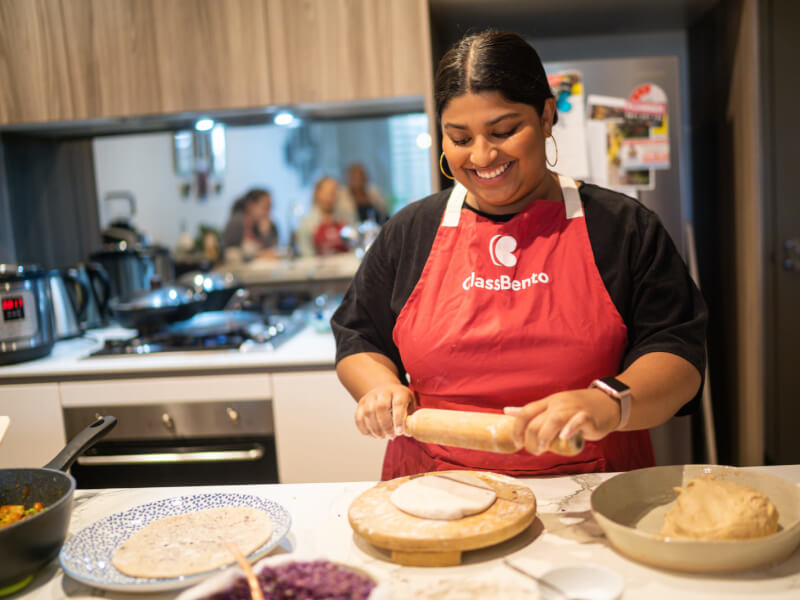
The idea behind sustainable cooking is pretty simple. You’re trying to lower your impact on the environment through cooking. There are a few different elements that go into sustainable cooking. On the one hand, you’re going to think about the ingredients - how they’re farmed and where they come from. Then, you’re going to take a look at your cooking practices, things like cooking times, serving ware, and even leftovers are all elements to think about if you want to make the switch to a more sustainable household.
When you think about whether the ingredients you use are responsible and sustainable, you might ask questions like:
- What is the farming process like?
- Does the farm use renewable energy?
- Are the ingredients packaged in single-use plastic?
- Does the ingredient go through processing that would include electricity or chemicals that might damage the environment?
And, that’s just the beginning. You might also consider whether your ingredients had to travel a long distance to get to you. If so, they had a higher impact on the environment than if you had bought local ingredients.
Now let's take a look at your cooking practices. If you’re considering making a Sunday roast, how long do you need to burn energy in order to cook that big piece of meat? What kind of plates are you serving your food on, and what is the impact of your dishwasher? Are you going to have to launder the table clothes after the big meal? You might also think about things like whether your leftovers will actually be eaten or if they’re going to be added to a landfill.
Making small changes like simply cooking a slightly smaller roast can reduce your impact by shortening the cooking time and reducing the number of leftovers.
History of sustainable kitchen practices
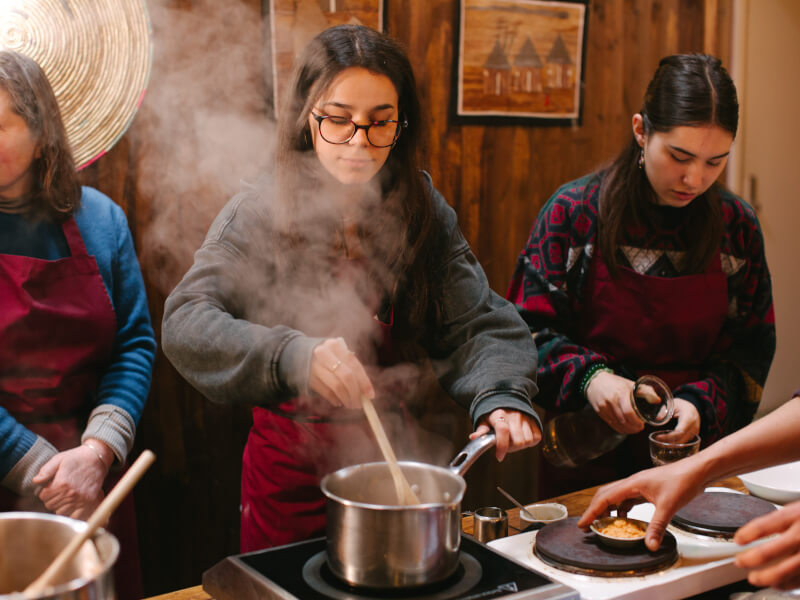
When you really think about it, sustainability in the kitchen is actually a very old concept. We don’t have to go back very many generations to a time when families had to use responsible ingredients because, well, that’s all there was. You ate apples when apples were in season because the infrastructure for shipping wasn’t the same as it is today. You bought your meat from a local butcher from a pig that grazed in an open field instead of a feedlot. And your family probably had quite a few recipes for the not-so sought-out parts of the pig to reduce waste and save money. And the other waste? Well, without the plastics and other non-biodegradable items that we have today, the impact of cooking was much, much lower.
But yes, for a number of years, those built-in sustainable cooking practices went away. They resurfaced with environmentalist movements in the 1960s and 1970s, and today, with the increasing threat of climate change, it seems that the sustainability movement is here to stay.
Why is sustainability in food important?

Well, the obvious reason is that it feels good to be doing your part to promote environmentalism. Your choices about what to eat for dinner may seem small, but they contribute to sustainable farming practices that can benefit all of us in the long run. And, there’s another benefit to sustainable cooking - it’s absolutely delicious. You’re going to be using farm-fresh ingredients without processing or preservatives and everything you eat will be perfectly in season. Sustainable cooking will invite you to use ingredients in new ways (with as little discarded as possible), and you’re going to love the chance to try new flavours and textures.
How cooking classes in Melbourne can help you on this journey
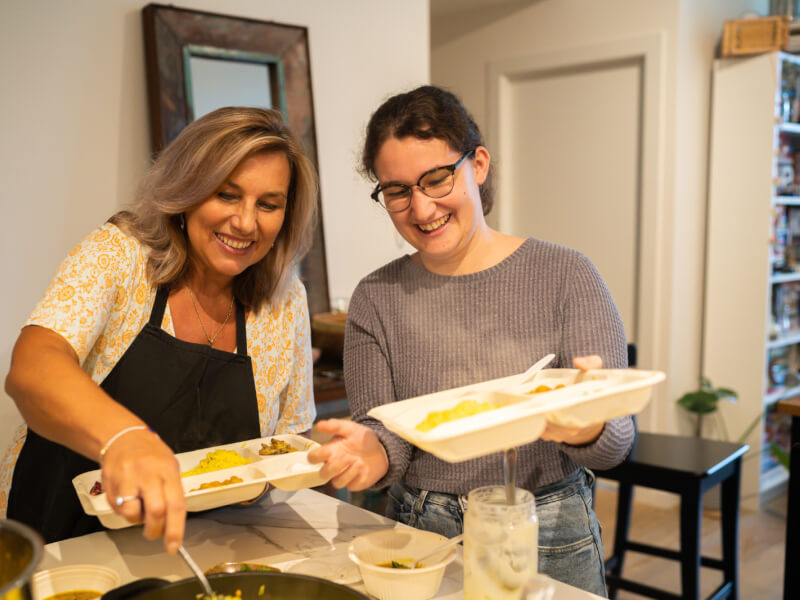
Whether you're searching for new things to do in Melbourne or team building activities that will teach your skill lifelong skills, cooking classes in Melbourne tick all the boxes. You'll get hands-on in the kitchen at local cooking schools and awaken all of your senses as you make your own food from scratch. No matter what cuisine you're learning how to cook, from authentic Italian pizza to soul-warming Indian food, you'll discover that homemade meals taste simply amazing.
This inspiration is the perfect way to kickstart your sustainable cooking journey as you learn just how easy it is to cook using fresh, local produce and ingredients which will ultimately encourage you to reduce your takeout and pre-packaged meals, eliminate waste (because you simply won't be able to not finish food this good) and plan your meals better to make shopping and cooking super simple for you!
Embrace seasonal cooking at this Japanese winter cooking class to make warming, nourishing meals with seasonal winter produce. Or learn how to make vegan gnocchi for simple and fresh cooking with a low carbon footprint. For those who like cooking from scratch, this sourdough masterclass will ensure you never have to purchase store-bought bread again!
Five easy ways you can be more sustainable in your kitchen:
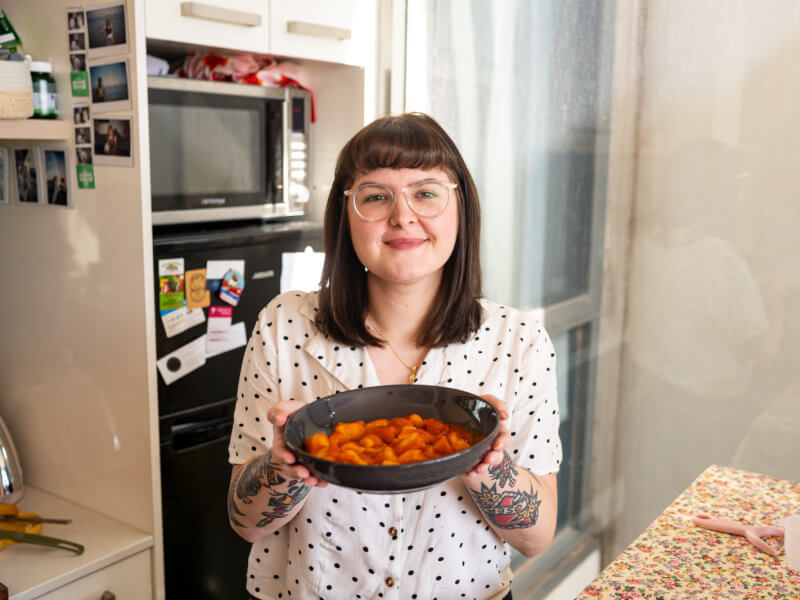
A lot of people are intimidated by the thought of incorporating sustainable cooking into their daily routine. But even small steps can make a big difference. As you get started, you’ll notice that you’ll naturally start to want to add more sustainable recipes into your diet because they are so tasty. Here are a couple of easy things you can do to start cooking more sustainably at home:
Buy only fresh ingredients that are in season
Fill your fridge with fruits and vegetables that are in season and local to your area. This might require you to do a little research to figure out what is being grown locally versus imported. But once you start buying local, seasonal ingredients, you’ll see that all of your dishes taste better.
Try veganism or eat less meat
This is a really hard one for many people, but cutting back on meat is good for the environment. You don’t have to cut meat out completely, but eating smaller portions or having a vegetarian day once a week can go a long way.
Interested in trying out vegan cooking? Discover just how easy it is to make your veggies and legumes shine with this vegan Indian cooking class.
Make sure the meat you do buy is responsibly sourced
For the dishes that require meat, make sure you have a sustainable source. No matter if it’s fish, chicken, pork, or beef, you can make your cooking more sustainable by buying meat that hasn’t been mass-produced (or overfished).
Take a sustainable cooking class
You don’t have to learn everything by trial and error! There are plenty of sustainable cooking classes that can teach you how to make delicious meals that are also environmentally friendly!
Grow your own vegetable garden
Supplement your groceries with homegrown veggies! Not only is gardening a great way to get outside and stay active, but you'll also save money, reduce your waste and help the planet.
The sustainable cooking movement is around for good, so it’s a great time to make the switch. Get in the kitchen and start thinking about how you can make your meals with the environment in mind!
Gift a unique experience
Pick a fun experience for them, or let them choose from our thousands of creative classes and kits.
Valid for 3 years.
card_giftcard Discover gift cards




